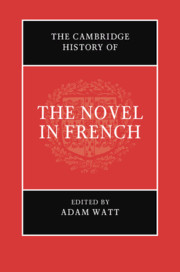Book contents
- The Cambridge History of the Novel in French
- The Cambridge History of the Novel in French
- Copyright page
- Contents
- Figures
- Contributors
- Acknowledgements
- Note on Conventions
- Chronology
- Introduction
- Part I Beginnings: From the Late Medieval to Madame de Lafayette
- 1 Late Medieval Precursors to the Novel: ‘aucune chose de nouvel’
- 2 Cultural Transmission and the Early French Novel
- 3 The Rise of the Novel in Sixteenth-Century France?
- 4 The Evolution of the Novel System in the Long Seventeenth Century
- 5 Seventeenth-Century French Women Writers and the Novel: A Challenge to Literary History
- 6 Madame de Lafayette and La Princesse de Clèves as Landmark
- Part II The Eighteenth Century: Learning, Letters, Libertinage
- Part III After the Revolution: The Novel in the Long Nineteenth Century
- Part IV From Naturalism to the Nouveau Roman
- Part V Fictions of the Fifth Republic: From de Gaulle to the Internet Age
- Index
- References
4 - The Evolution of the Novel System in the Long Seventeenth Century
from Part I - Beginnings: From the Late Medieval to Madame de Lafayette
Published online by Cambridge University Press: 04 February 2021
- The Cambridge History of the Novel in French
- The Cambridge History of the Novel in French
- Copyright page
- Contents
- Figures
- Contributors
- Acknowledgements
- Note on Conventions
- Chronology
- Introduction
- Part I Beginnings: From the Late Medieval to Madame de Lafayette
- 1 Late Medieval Precursors to the Novel: ‘aucune chose de nouvel’
- 2 Cultural Transmission and the Early French Novel
- 3 The Rise of the Novel in Sixteenth-Century France?
- 4 The Evolution of the Novel System in the Long Seventeenth Century
- 5 Seventeenth-Century French Women Writers and the Novel: A Challenge to Literary History
- 6 Madame de Lafayette and La Princesse de Clèves as Landmark
- Part II The Eighteenth Century: Learning, Letters, Libertinage
- Part III After the Revolution: The Novel in the Long Nineteenth Century
- Part IV From Naturalism to the Nouveau Roman
- Part V Fictions of the Fifth Republic: From de Gaulle to the Internet Age
- Index
- References
Summary
A commonplace of French literary history holds that around 1660 an archaic novelistic form called the roman was suddenly replaced by the nouvelle, and that this replacement amounts to the birth of the novel in a modern sense. In this quantitative analysis, I tag of a sample of novels appearing between 1601 and 1730 for a variety of characteristics long said to distinguish romans from nouvelles (length, use of inset narratives, historical setting); I add the further variables of protagonist type (drawn from history or not) and truth posture (assertions of veracity and admissions of invention). Such analysis reveals that although romans do predominate in the first half of the century while nouvelles flourish in the second, 1660 cannot be confirmed as a threshold. In fact, far from being diametrically opposed, romans and nouvelles are in many respects merely different moments in the evolution of the same basic artifact, one to be eventually replaced by the first-person forms familiar from the eighteenth century. More broadly, a quantitative approach suggests that the novel’s history should be thought of less as a story of stability and rupture than as continual — but patterned — flux.
Keywords
- Type
- Chapter
- Information
- The Cambridge History of the Novel in French , pp. 71 - 94Publisher: Cambridge University PressPrint publication year: 2021



